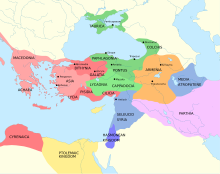| This article needs additional citations for verification. Please help improve this article by adding citations to reliable sources. Unsourced material may be challenged and removed. Find sources: "89 BC" – news · newspapers · books · scholar · JSTOR (April 2022) (Learn how and when to remove this message) |
Calendar year
| Millennium: | 1st millennium BC |
|---|---|
| Centuries: | |
| Decades: | |
| Years: |
| 89 BC by topic |
| Politics |
|---|
| Categories |
| Gregorian calendar | 89 BC LXXXIX BC |
| Ab urbe condita | 665 |
| Ancient Egypt era | XXXIII dynasty, 235 |
| - Pharaoh | Ptolemy X Alexander, 19 |
| Ancient Greek era | 172nd Olympiad, year 4 |
| Assyrian calendar | 4662 |
| Balinese saka calendar | N/A |
| Bengali calendar | −681 |
| Berber calendar | 862 |
| Buddhist calendar | 456 |
| Burmese calendar | −726 |
| Byzantine calendar | 5420–5421 |
| Chinese calendar | 辛卯年 (Metal Rabbit) 2609 or 2402 — to — 壬辰年 (Water Dragon) 2610 or 2403 |
| Coptic calendar | −372 – −371 |
| Discordian calendar | 1078 |
| Ethiopian calendar | −96 – −95 |
| Hebrew calendar | 3672–3673 |
| Hindu calendars | |
| - Vikram Samvat | −32 – −31 |
| - Shaka Samvat | N/A |
| - Kali Yuga | 3012–3013 |
| Holocene calendar | 9912 |
| Iranian calendar | 710 BP – 709 BP |
| Islamic calendar | 732 BH – 731 BH |
| Javanese calendar | N/A |
| Julian calendar | N/A |
| Korean calendar | 2245 |
| Minguo calendar | 2000 before ROC 民前2000年 |
| Nanakshahi calendar | −1556 |
| Seleucid era | 223/224 AG |
| Thai solar calendar | 454–455 |
| Tibetan calendar | 阴金兔年 (female Iron-Rabbit) 38 or −343 or −1115 — to — 阳水龙年 (male Water-Dragon) 39 or −342 or −1114 |

Year 89 BC was a year of the pre-Julian Roman calendar. At the time it was known as the Year of the Consulship of Strabo and Cato (or, less frequently, year 665 Ab urbe condita) and the Fourth Year of Zhenghe. The denomination 89 BC for this year has been used since the early medieval period, when the Anno Domini calendar era became the prevalent method in Europe for naming years.
Events
By place
Roman Republic
- Consuls: Gnaeus Pompeius Strabo and Lucius Porcius Cato.
- Social War:
- Roman forces under Lucius Porcius Cato are defeated by the Italian rebels in the Battle of Fucine Lake, Cato is killed.
- The Roman army of Gnaeus Pompeius Strabo decisively defeats the rebels in the Battle of Asculum.
- Lex Plautia Papiria extends citizenship to all Italians who applied for it within 60 days. The new citizens are enrolled in eight designated tribes, to prevent domination of the assemblies.
- Lex Pompeia grants Latin rights to cities in Cisalpine Gaul.
- Pompeii is annexed by the Roman Republic.
- Cicero ends his service in the Roman army.
Asia Minor
- Mithridates VI of Pontus invades Bithynia and Cappadocia, thus beginning the First Mithridatic War.
Xiongnu
- The former Han General-in-Chief Li Guangli, now the son-in-law of Hulugu Chanyu, is arrested and sacrificed to the gods to restore the health of Hulugu's mother.
Births
- Empress Shangguan, wife to Emperor Zhao of Han (d. 37 BC)
Deaths
- Aulus Sempronius Asellio, Roman praetor (murdered by creditors)
- Lucius Porcius Cato, Roman politician and general
- Marcus Aemilius Scaurus, Roman politician (b. c. 163 BC)
- Titus Didius, killed in battle during the Social War
- Li Guangli, Chinese General-in-Chief (Han dynasty)
References
- Hung, Hing Ming (2020). The Magnificent Emperor Wu: China's Han Dynasty. pp. 235–236. ISBN 978-1628944167.